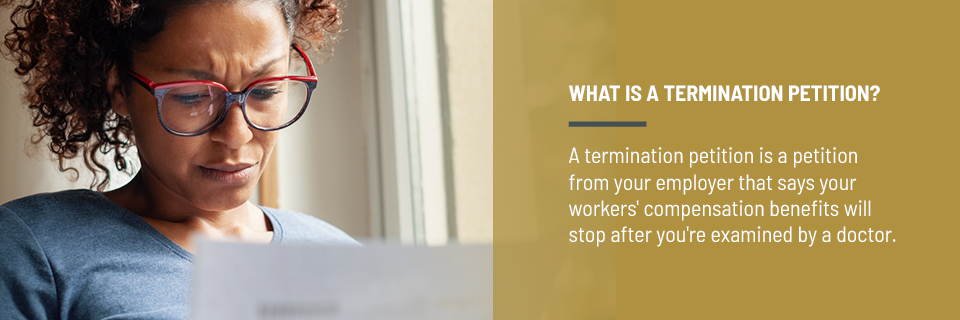Table of Contents
Free Case Review I Need Help With My Appeal
Have your workers’ comp benefits been cut off even though you remain injured and out of work? This confusing and upsetting development can occur for Pennsylvania residents receiving compensation for the injury they received on the job.
What does the suspension of workers’ comp benefits mean? When it occurs, you lose the money you had been receiving to partially cover the loss of your wages. The insurance company may continue to pay your medical bills. If you receive notice of a suspension of benefits, you can appeal this decision to a judge to get your workers’ compensation restored. You should contact a workers’ comp lawyer right away to ensure you get the best legal advice.
Signs Your Employer Wants to Modify or Terminate Your Workers’ Compensation Benefits
The following are warning signs that your employer is attempting to modify or terminate your workers’ compensation benefits:
1. Your Employer’s Insurance Company Requests an IRE
An Impairment Rating Evaluation is a medical examination that is performed for the purpose of determining the extent of an employee’s disability. After you have received total disability compensation for 104 weeks, your employer’s insurance carrier may request an IRE.
In Pennsylvania, workers who receive total disability compensation are provided two-thirds of their average weekly income until they are able to return to work. An IRE will determine whether you should retain your total disability status. Insurance companies don’t want to compensate workers longer than absolutely necessary, so they will request an IRE in the hopes of shortening the time you’ll receive compensation.
You’ll receive the notice of the IRE request, which will provide you with information about the evaluation, such as the date, time, location and the doctor’s name. The insurance company is responsible for scheduling the appointment.
Employer’s insurance companies may claim you’re required to attend this examination, or you will lose your benefits. With a qualified attorney on your side, you may be able to fight against an IRE by either skipping the examination or filing a legal challenge after the examination.
If you go through with the examination, a physician will judge your condition and impairment. You may be tested on your ability to:
- Balance
- Lift
- Move your limbs
The doctor will also test any other skills that may have been affected by your injury. To be considered impaired, you must have lost significant use of a body structure or function.
Within 30 days after the appointment, the doctor will send the medical evaluation and impairment rating form to you and to your employer’s insurance carrier. Over a period of 12 months, an insurance carrier can request two Impairment Rating Evaluations.
2. Your Employer’s Insurance Company Requests an IME
Despite its name, an Independent Medical Exam is not independent. You cannot choose your own doctor — instead, a doctor is selected and paid by your employer’s insurer.
Typically, an IME is requested by an employer’s insurance company when it disagrees with the diagnosis provided by the employee’s doctor. This is particularly the case for diagnoses that you’ve sustained a permanent disability or that you require surgery or extensive medical treatment. In other instances, the IME may be ordered by your workers’ compensation judge to resolve a dispute between you and the insurance company.
You’ll be notified about the time and location of the examination, along with the name of the doctor who will be performing the exam. During the exam, the doctor will form an opinion on your disability, the cause of your injury and your ability to work. Keep in mind there is no doctor-patient confidentiality during this exam, so anything you say to the doctor could be included in the report.
Unlike an IRE, you are required to attend an IME under Pennsylvania law.
Frequently Asked Questions About Stopped Workers’ Compensation Payments
The following are frequently asked questions about suspended workman’s comp benefits:
1. What Is a Termination Petition?
A termination petition is a petition from your employer that says your workers’ compensation benefits will stop after you’re examined by a doctor. An employer files this termination petition because they believe you’ve recovered and can return to work.
2. Will a Termination Petition Impact My Benefits?
Though this petition can seem intimidating, don’t worry. Before your payments stop, you’ll have hearings in which the workers’ compensation judge will make the final decision on whether your benefits should stop. You should continue receiving your benefits until the hearings take place. In fact, your payments may not stop at all. If your personal physician doesn’t think you are able to work or believes that you are not yet fully recovered, you may not have to return to work, and you should continue receiving your workers’ compensation benefits.
If your doctor hasn’t released you to return to work or you believe you’re too injured to return to work, speak with an attorney as soon as possible.
3. How Will I Know When the Termination Petition Has Been Filed?
You’ll receive a petition to modify, suspend or terminate when a termination petition has been filed. As soon as you receive a termination petition, contact an attorney. An attorney can provide you with legal advice about your rights and represent you in a hearing. These petitions also tend to come with a strict deadline to respond, so you should get legal advice from an attorney as soon as possible to ensure you don’t miss the deadline.
4. Can Workers’ Comp Stop Payments Without Notice?
To stop or lower your wage loss benefits, your employer has to a Notice of Suspension after you return to work at full wages or file a petition to modify, suspend or end your benefits. When they file it, you’ll receive a notification. You can fight the Notice or Petition with the assistance of an experienced workers’ comp attorney, as your employer cannot suddenly stop paying you for no reason.
5. What Are the Conditions Under Which Your Workers’ Compensation Benefits May Change?
Under a number of conditions, workers’ compensation benefits can be suspended or terminated. Your employer must prove that these conditions have happened if they want to stop paying benefits. The conditions include the following:
- You refuse to take a medical exam ordered by the insurance company.
- You refuse reasonable medical services recommended to treat your injury.
- You go to jail after being convicted of a crime.
- You do not return the employee verification form to your employer’s workers’ compensation insurance company within the mandated 30-day period.
- You return to work at full wages, and your employer files a timely notice that you are suspended because of your earning.
In many of these cases, you have control of the situation. You can ensure you get forms turned in on time and make the appointments with the physician requested by the insurance company. You may run into other circumstances where benefits end because of something outside of your control. These instances may include the following:
- Your 500-week period of partial disability ends.
- A judge reviews your workers’ compensation claim and rules that benefits should end.
- You accept a lump sum from your employer under a Compromise and Release.
- You go back to work, and your job pays you more or the same as you were making before the injury.
- You sign a Final Receipt declaring that you’ve fully recovered from your injury, and it also says you agree to stop receiving benefits from your injury.
If your workers’ compensation benefits are terminated or suspended, reach out to a qualified workers’ comp attorney.
What You Should Do If Your Benefits Are Threatened
What steps should you take as the injured party if you feel like you can’t return to work? If you think your benefits are being threatened, you may need to:
1. Hire a Workers’ Compensation Lawyer
If your workers’ comp benefits are threatened, your first step should be hiring a workers’ compensation lawyer. An experienced workers’ comp attorney can help you determine what the best course of action is for your situation. If you’re feeling overwhelmed with navigating this legal process, an attorney can help guide you. Your attorney can review your medical file and your injury history. Having an experienced attorney on your side can put you in a better position and give you the peace of mind you need by knowing you don’t have to go through this process alone.
2. Consult With Your Doctor
If your employer’s doctor doesn’t believe you’re ready to go back to work, your employer will likely stop threatening your benefits. If your personal doctor says you’re not ready to return to work, but your employer’s doctor says you are, your employer may file a termination petition or suspension petition.
3. Attend Mediation
When a case is in Court, you may be required to attend mediation with your employer, your employer’s insurance carrier and a workers’ compensation judge. The judge meets with both parties to try to resolve the case. The Pennsylvania Workers’ Compensation Act highly encourages settlement, but you don’t need to settle your case. Hiring an attorney is particularly important if you want to know the real value of your case or if don’t want to settle at all.
Contact Frommer D’Amico With Questions About Workers’ Compensation
Workers’ compensation laws can appear confusing if you do not have a background in this area. If you receive notice that your benefits are getting suspended or terminated, contact the attorneys at Frommer D’Amico. We can advise you on whether your employer is taking legal action or whether you may be able to fight this development.
Our lawyers specialize in workers’ compensation — we only take these types of cases. We can travel to your location for meetings, and we charge low fees. Schedule a free consultation today by calling 717-400-1000, or fill out our online form to get in touch.

Joe D’Amico has more than 20 years of experience fighting for injured workers. He is Certified as an Expert in Pennsylvania Workers’ Compensation Law by the Supreme Court of Pennsylvania. Joe is one of the very few Pennsylvania workers’ compensation attorneys who have obtained a recovery in excess of $1.5 million for an injured worker.
Reviewed by Joe D’Amico.



